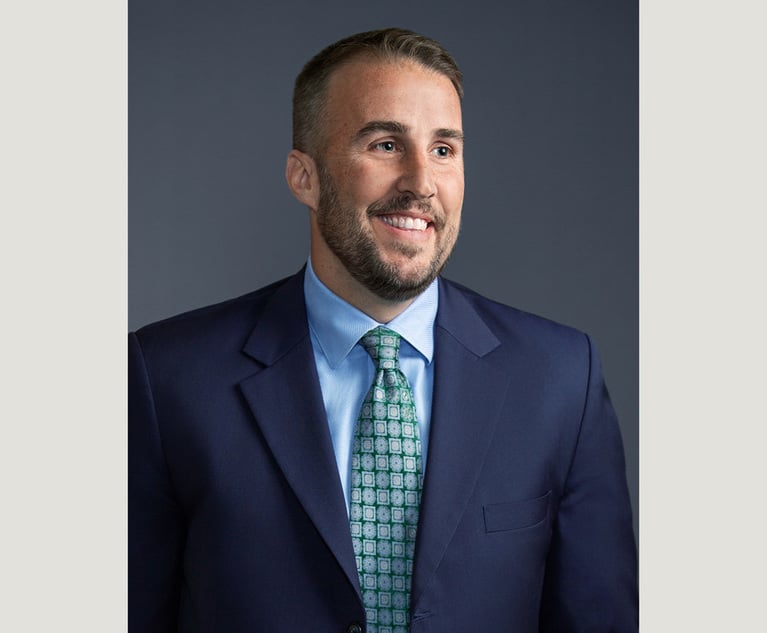 Credit: Farknot Architect/Adobe Stock
Credit: Farknot Architect/Adobe Stock Family Lawyers Often Experience Secondary Trauma: What Are You Going To Do About It?
Family law attorneys may spend hours every day coping with people who are deeply unhappy and distraught. What can we do to cope?
May 25, 2023 at 02:22 PM
5 minute read
If you practice family law for any length of time, you are likely at some point to experience secondary trauma. The massive changes our society has undergone, and is still undergoing, have affected families—and therefore family law—more than any other legal practice area and will continue to do so. We already experience stress from the constant adjustment of our methods and practices to deal with new situations, some of which are not yet adequately covered by current law. Consider for a moment:
- The advent of same-sex marriage and same-sex divorce, as well as the continued challenges same-sex couples still face.
- New kinds of blended families that may include his, her and their children, as well as both biological and adopted children.
- Families from other countries that may have children and property here and abroad and have radically different marriage (and divorce) customs in their countries of origin.
- New kinds of methods of reproduction, including in vitro fertilization and the use of surrogate mothers, which are also being challenged by new legislation.
- The heightened friction and polarization in society, which is bleeding into families and the work of those who serve families.
Now, on top of all that, we are dealing with many clients who are going through one of the worst experiences of their lives. Our clients and their soon-to-be exes are naturally emotional and upset. We may spend hours every day coping with people who are deeply unhappy and distraught.
 Susan Myres is a Houston-based, board-certified family lawyer with more than 35 years
Susan Myres is a Houston-based, board-certified family lawyer with more than 35 years of experience.
We also sometimes encounter stories that are really difficult to hear. Our clients may tell us about domestic manipulation and abuse, the mistreatment and abuse of children, and threats of violence or actual violence. About 10 years ago, one of my clients, a 44-year-old, much-beloved veterinarian, was murdered by her almost ex-husband over Memorial Day weekend. This man had been controlling but had never been violent before. A strict restraining order had been granted against him when he brought a gun to her office, but it did not save her. He violated the order, infiltrated his way into her backyard and then shot her and himself while their children were home.
This content has been archived. It is available through our partners, LexisNexis® and Bloomberg Law.
To view this content, please continue to their sites.
Not a Lexis Subscriber?
Subscribe Now
Not a Bloomberg Law Subscriber?
Subscribe Now
NOT FOR REPRINT
© 2025 ALM Global, LLC, All Rights Reserved. Request academic re-use from www.copyright.com. All other uses, submit a request to [email protected]. For more information visit Asset & Logo Licensing.
You Might Like
View All
More Young Lawyers Are Entering Big Law With Mental Health Issues. Are Firms Ready to Accommodate Them?

Trending Stories
- 1Perkins Coie Lures Former Longtime Wilson Sonsini Tech Transactions Partner
- 2‘The Decision Will Help Others’: NJ Supreme Court Reverses Appellate Div. in OPRA Claim Over Body-Worn Camera Footage
- 3MoFo Associate Sees a Familiar Face During Her First Appellate Argument: Justice Breyer
- 4Antitrust in Trump 2.0: Expect Gap Filling from State Attorneys General
- 5People in the News—Jan. 22, 2025—Knox McLaughlin, Saxton & Stump
Who Got The Work
J. Brugh Lower of Gibbons has entered an appearance for industrial equipment supplier Devco Corporation in a pending trademark infringement lawsuit. The suit, accusing the defendant of selling knock-off Graco products, was filed Dec. 18 in New Jersey District Court by Rivkin Radler on behalf of Graco Inc. and Graco Minnesota. The case, assigned to U.S. District Judge Zahid N. Quraishi, is 3:24-cv-11294, Graco Inc. et al v. Devco Corporation.
Who Got The Work
Rebecca Maller-Stein and Kent A. Yalowitz of Arnold & Porter Kaye Scholer have entered their appearances for Hanaco Venture Capital and its executives, Lior Prosor and David Frankel, in a pending securities lawsuit. The action, filed on Dec. 24 in New York Southern District Court by Zell, Aron & Co. on behalf of Goldeneye Advisors, accuses the defendants of negligently and fraudulently managing the plaintiff's $1 million investment. The case, assigned to U.S. District Judge Vernon S. Broderick, is 1:24-cv-09918, Goldeneye Advisors, LLC v. Hanaco Venture Capital, Ltd. et al.
Who Got The Work
Attorneys from A&O Shearman has stepped in as defense counsel for Toronto-Dominion Bank and other defendants in a pending securities class action. The suit, filed Dec. 11 in New York Southern District Court by Bleichmar Fonti & Auld, accuses the defendants of concealing the bank's 'pervasive' deficiencies in regards to its compliance with the Bank Secrecy Act and the quality of its anti-money laundering controls. The case, assigned to U.S. District Judge Arun Subramanian, is 1:24-cv-09445, Gonzalez v. The Toronto-Dominion Bank et al.
Who Got The Work
Crown Castle International, a Pennsylvania company providing shared communications infrastructure, has turned to Luke D. Wolf of Gordon Rees Scully Mansukhani to fend off a pending breach-of-contract lawsuit. The court action, filed Nov. 25 in Michigan Eastern District Court by Hooper Hathaway PC on behalf of The Town Residences LLC, accuses Crown Castle of failing to transfer approximately $30,000 in utility payments from T-Mobile in breach of a roof-top lease and assignment agreement. The case, assigned to U.S. District Judge Susan K. Declercq, is 2:24-cv-13131, The Town Residences LLC v. T-Mobile US, Inc. et al.
Who Got The Work
Wilfred P. Coronato and Daniel M. Schwartz of McCarter & English have stepped in as defense counsel to Electrolux Home Products Inc. in a pending product liability lawsuit. The court action, filed Nov. 26 in New York Eastern District Court by Poulos Lopiccolo PC and Nagel Rice LLP on behalf of David Stern, alleges that the defendant's refrigerators’ drawers and shelving repeatedly break and fall apart within months after purchase. The case, assigned to U.S. District Judge Joan M. Azrack, is 2:24-cv-08204, Stern v. Electrolux Home Products, Inc.
Featured Firms
Law Offices of Gary Martin Hays & Associates, P.C.
(470) 294-1674
Law Offices of Mark E. Salomone
(857) 444-6468
Smith & Hassler
(713) 739-1250








